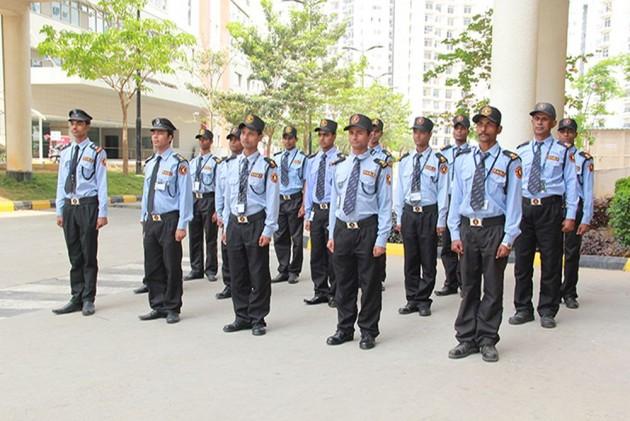Overworked and Underpaid: Ease of Doing Business Puts Security Guards at Unease in Bengal

Representational Image. Image Courtesy: Outlook India
Kolkata: Private security guards in the city and other urban centres perhaps have had the toughest duty schedule at Durga Puja pandals this year because of the persisting pandemic. In addition to discharging their primary role as guards, they were required to ensure adherence to Covid-19 protocol of physical distancing, screening and hand sanitisation. In some big ticket Puja pandals, they were required to handle ‘thermal guns’ in addition to their batons and walkie talkies.
But, the security guards, very largely from the unorganised sector, do not still have an idea as to whether their ‘maliks’ (bosses) will consider paying them some amount extra amount for the extra burden they have had to shoulder.
“It all depends on the mood of the malik,” said Gopal Mandal, for whom there was no opportunity even to ask his agency’s supervisor whether he would be free after “the mandatory duty of 12 hours.” Eventually, it turned out to be close to 13 hours by the time the reliever came, Gopal explained his predicament to NewsClick. He hastened to add that if ever he was late in reporting, say even by half-an-hour, there would be deduction from his monthly wages.
The pitiable working conditions of the private security guards remain unaddressed by the state authorities even though all the acts and rules hitherto framed remain applicable on paper, says Tulu Ghosh Dastidar, who heads the unregistered West Bengal Security Workers Federation. The organisation is affiliated to the Centre of Indian Trade Unions (CITU). At the state level, there is the West Bengal Security Agencies (Regulation) Rules 2007, whose enforcement followed the Union government’s Private Security Agencies Regulation Act 2005. All the other relevant legislations – Arms Act 1959, Foreign Direct Investment policy, Minimum Wages Act 1948, Provident Fund Act 1952, Employees State Insurance Act 1948, Payment of Bonus Act 1965 and Payment of Gratuity Act 1972 -- are applicable. But, private security outfits complying with these protective legislations are few and far between. The normal in this business segment is to follow the laws in the breach. Or else, “how does one explain monthly payments between Rs 5,000 and Rs 7,000 by a large number of unorganised sector security agencies to their employees?” asked Ghosh Dastidar.
There are many instances of the guards not even having proper appointment letters. The uniform with the name of the service provider is perhaps their only consolation.
Lack of Political Will
The situation has steadily deteriorated since the Trinamool Congress (TMC) government assumed office in May 2011 and Mamata Banerjee became the chief minister. The state government does not encourage formation of trade unions; applications for registration are either kept pending indefinitely or acknowledged with counter-questions, which make the state government’s intentions clear. Meanwhile, the meetings of State Labour Advisory Board are rarely held. What is worse is that even where there are existing unions, TMC activists threaten the union members with consequences if they do not fold up the organisations.
In the Calcutta Leather Complex, where there are several hundred tanneries and finished leather goods units, there is an unwritten ban on formation of trade unions. “This is Mamata Banerjee’s version of assuring prospective investors of the ease of doing business in her state,” say senior political and trade union leaders when asked by NewsClick to give their assessment of the state’s labour situation. Given the high rate of unemployment in the state, agencies find it relatively easy to source youths with elementary school-level education from rural and district towns for recruitment as security guards. The sourcing becomes easier during lean agriculture seasons. For these youths, working as guards at urban and semi-urban centres then becomes an unavoidable option.
Bablu Hait, who runs a security agency, said that earlier adherence to labour laws was relatively an easy proposition because there were prescribed formats for bipartite or tripartite meetings. “Since the TMC came to power, we have to deal with several factions that have little regard for norms. If they have to be satisfied, know it for certain that undesirable methods have to be adopted,” Hait said.
Security workers Shankar Mondol and supervisor Bhaskar Naskar spoke of grossly inadequate training facilities for them although they are often called upon to tackle security situations they are not familiar with. Even for duty as armed guards, there are agencies that do not bother to provide permissible arms and instead ask the ex-servicemen to use the arms they officially possess.
According to Ghosh Dastidar, around 30,000 security guards are engaged by different establishments in Kolkata. Siliguri, Haldia, Durgapur, Purba Bardhaman and Pashcim Bardhaman are other important centres where many security guards are posted. In West Bengal, around 2.5 lakh people earn their livelihood by working as security guards and supervisors.
Expert observations and survey findings:
When asked about compliance of agencies with the applicable laws and rules, Chennai-based labour lawyer Ramapriya Gopalakrishnan told NewsClick that the most flagrant violation that “everybody is guilty” of concerns the long working hours. Nobody follows the prescribed eight-hour duty rule and in reality, the duty duration stretches invariably to 12 hours and it is difficult to vouchsafe if in all such cases extra payment is made. It may be beyond 12 hours if the reliever reports late.
The passage of the Private Security Agencies Regulation Act (PSARA), 2005, by the then Left-supported first United Progressive Alliance (UPA) government brought a measure of discipline in the private security business and states framed their own rules. According to Gopalakrishnan, Maharashtra then introduced some well-intentioned measures to safeguard the interest of security guards.
However, the role of contractors who work between the organisation requisitioning the security guards and the security agencies providing guards, at times complicates matters and the payment under the Minimum Wages Act becomes a bone of contention. The employer and the agency generally indulge in charges and counter-charges. On some issues, the state redressal mechanisms work at present but the issue of working hours remains unaddressed, the labour lawyer observed.
A report dated March 18, 2019, and published in The Indian Express on a situation in Greater Noida quoted labour advocate Ravi Singhania as saying that employers and agencies that supply guards use legal loopholes to exploit hapless job seekers. It is largely a small-scale and unorganised sector and despite PSARA 2005, the entry barrier is low and there is corruption and government inefficiency in the renewal of licences. The small outfits supplying guards try to keep their costs low to win over clients. The low cost is possible to achieve only by disregarding labour laws.
The same Indian Express report quoted Uttar Pradesh labour department officials as saying that under the recast inspection policy, inspections can be carried out only when a complaint citing violation of prescribed provision has been filed and that too after getting the competent authority’s nod. Any suo moto action is now ruled out. The security business is a big source of employment and that explains why the state government prefers silence against violation. A more interesting observation mentioned in the report is that “the government’s policy of ease of doing business has given these agencies a free hand”.
A study commissioned by industry outfit FICCI a few years back had segmented the security business into personal security market (PSM) and private security industry (PSI). The study noted that the demand for security services has increased tremendously over the past decade “due to rising urbanisation, perceived risks of crime and terrorism, belief that public safety measures are insufficient, growth of middle class with assets to protect and means to pay and spurt in building construction.” The risk factor has prompted the authorities to stipulate deployment of guards at schools, ATMs and locations with CCTVs.
The study estimated PSM at about Rs 57,000 crore in 2016, which was likely to touch Rs 99,000 crore in 2020 and Rs 1.5 lakh crore by 2022. PSI has become an important employment generator as well, engaging close to 90 lakh unskilled people with low level of education in about 22,000 private security agencies (PSAs) across the country. An addition of over 30 lakh to this number of workers is expected by 2022. The number of PSAs too will grow as manned guarding is the largest component with cash management services (CMS) being a remote second. Currently, less than a dozen players dominate CMS.
Get the latest reports & analysis with people's perspective on Protests, movements & deep analytical videos, discussions of the current affairs in your Telegram app. Subscribe to NewsClick's Telegram channel & get Real-Time updates on stories, as they get published on our website.
























